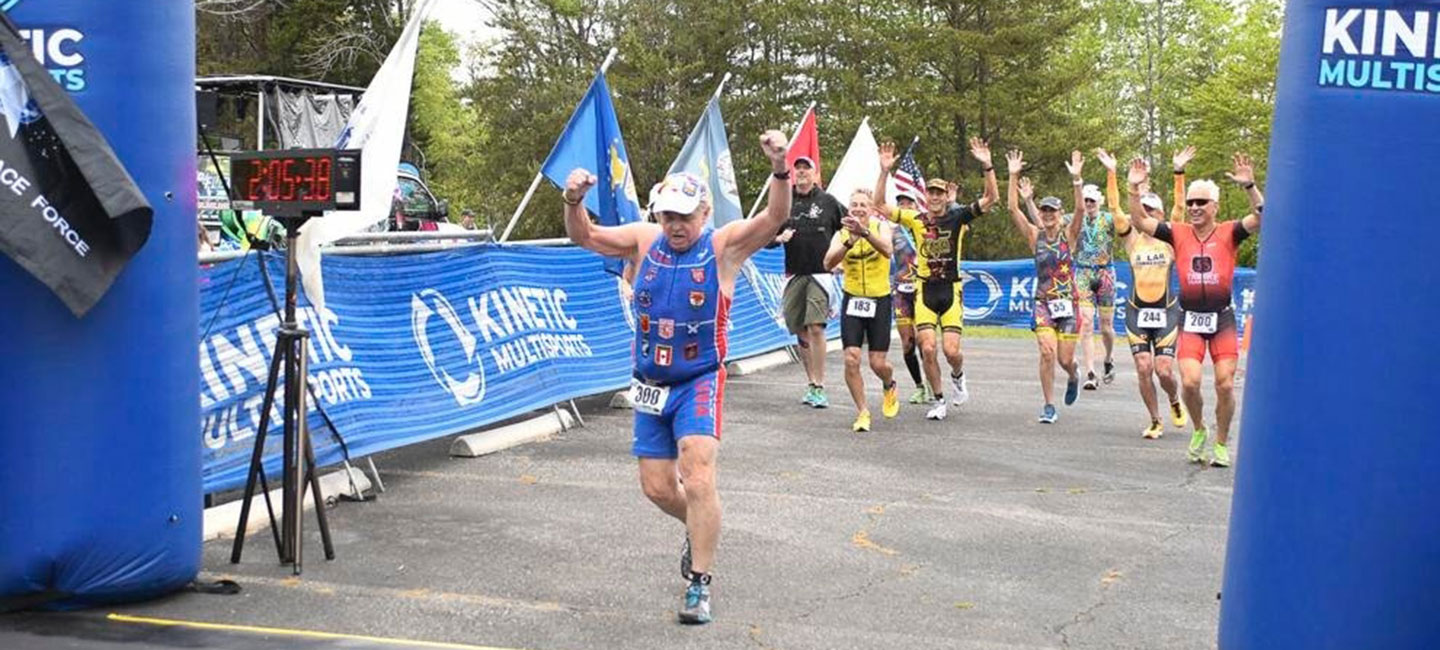Cancer Can’t Slow Triathlete Down
It all started with a pretty girl and a kiss.
It was 1984. Michael Morris was watching a triathlon in his hometown of Roanoke, Virginia, and was struck by a woman crossing the finish line to kiss her husband and her kids.
“Is there anything to eat?” Morris overheard her casually ask.
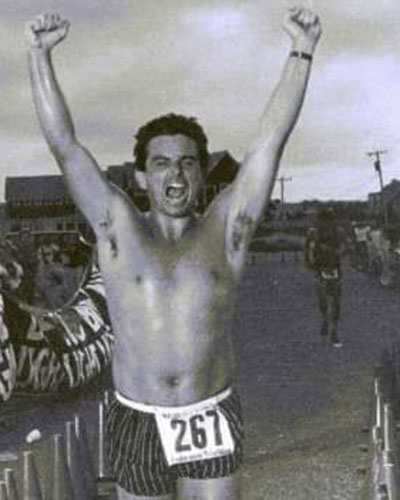
Michael Morris finishes his first Ironman distance race in 1987 in Cape Cod.
“She was out there for seven hours and she was acting like it was nothing,” Morris said.
Morris, already an avid runner, was immediately hooked on the possibility of a new sport and decided it was time to start swimming.
Morris signed up for his first triathlon in 1985. He always wanted to be home for dinner with his wife and three kids, so he trained in the early mornings or ran at noon while working full days as a certified public accountant. He competed in more and more races, making more and more friends along the way. Soon, he was doing international competitions as part of Team USA. He is a five-time Ironman, has completed a triathlon in every state in the U.S. and climbed Mount Kilimanjaro.
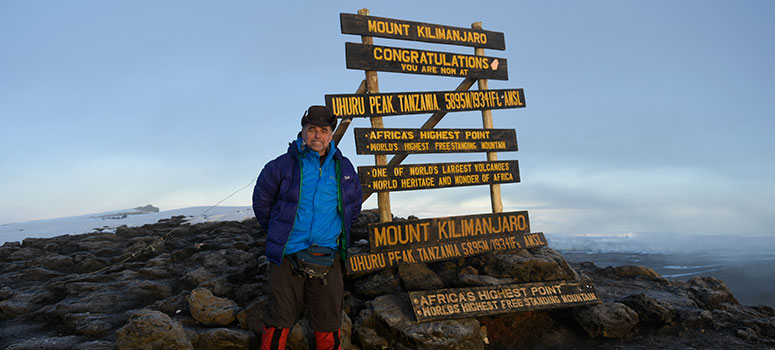
Morris reaches the highest point on Mount Kilimanjaro.
But in 2021, the 67-year-old athlete started to slow down. His mile time was dropping — 11 minutes a mile, then 13 minutes a mile — and he didn’t know why. Ten days after completing a triathlon in August, Morris’ training partner noticed he was having trouble forming words. He ran 4 ½ miles then went to the hospital.
Scans showed Morris had a brain tumor and he had surgery the next day. Pathology reports showed the tumor was cancer that had spread from his kidney.
“The oncologist told me, ‘You have stage 4 renal cancer. I can’t cure you and you will die from it,’” Morris said. “When I was diagnosed, I had had a full card. I had no regrets or things I didn’t do. I just said if you’re going to punch my ticket, let’s punch it, but until we do I am just going to keep going.”
Morris made a deal with his wife: As long as he could continue doing the things he could before his diagnosis, they weren’t going to talk about his mortality.
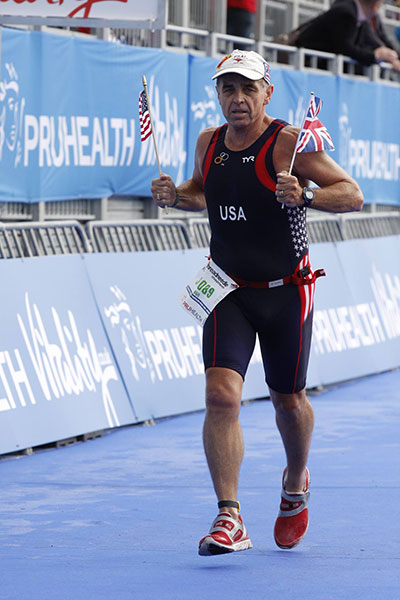
Morris competes at the World Triathlon in London in 2013.
He kept running. He kept biking. He kept swimming. He set the goal of competing in six more races before April 30, 2022, to hit his 300th triathlon.
Morris traveled to Florida in November 2021 for two races. While picking up a race packet, he met someone who was treated for glioblastoma and cured at Moffitt Cancer Center. He went online and filled out a new patient form. On Dec. 1, he was in Tampa for his first appointment.
Doctors determined at the time that they wouldn’t take his kidney out and recommended Morris continue to take his immunotherapy and targeted therapy medication. Even though the treatment was causing pain and tingling in his feet, he pushed on.
He kept running. He kept biking. He kept swimming.
On April 30, 2022, Morris crossed the finish line of his 300th triathlon, at the same race he founded 25 years before. Friends flew in from all over the country to race with him, many of them slowing their pace to match his.
After doctors reduced his targeted therapy medication, he told them, “I feel too damn good for having stage 4 cancer.” When he traveled to Tampa for his appointments at Moffitt at International Plaza, of course he walked the more than three miles from the airport to the clinic.
In the summer, after scans showed Morris’ tumor was shrinking less than previous scans, he and his doctors made the decision it was time to take out his kidney. He had the surgery on June 16 and post-surgery pathology reports found 80% of the tumor was already dead from the prior treatment. Post-surgery scans revealed surgeons had gotten all of the active disease.
“I was told to continue taking the medication for two years and I thought, am I going to be alive in two years? And then when the scans were clear, I thought the sky looks a little bluer,” Morris said.
“Mr. Morris has had multidisciplinary care for his metastatic kidney cancer and everyday he seems to be falling into the rare category of having a durable response to the treatment he’s received,” said Dr. Logan Zemp, Morris’ genitourinary oncologist at Moffitt. “I have no doubt that his positive outlook as well as his incredible desire to be active during his treatment has helped his overall outcome. He’s truly an inspiration to those around him from the medical profession, the triathlon community and other cancer patients.”
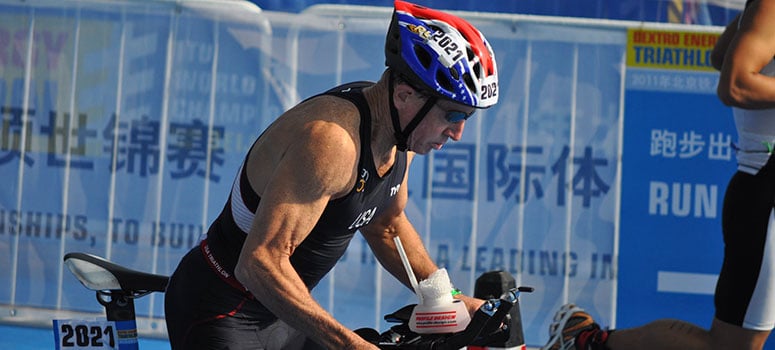
Morris rides his bike at the World Triathlon in Beijing.
Thirty-eight days after his kidney was removed, Morris ran his 301st triathlon. On Aug. 13, he ran another one to mark his one-year survival since his diagnosis.
“No one gave me a rule book for cancer,” Morris said. “People are like, ‘You are running, swimming and biking?’ Well, why not? I am just doing the things I would normally do.”
Now that he’s completed his long-term goal of hitting 300 races (and then some), Morris is focusing more on short-term goals. He began his career in the 20-29 age group and wants to compete next year in the 70-74 group, his 10th five-year competition age group.
He will keep running. He will keep biking. He will keep swimming.
“You think I am extraordinary, but I am just living.”


